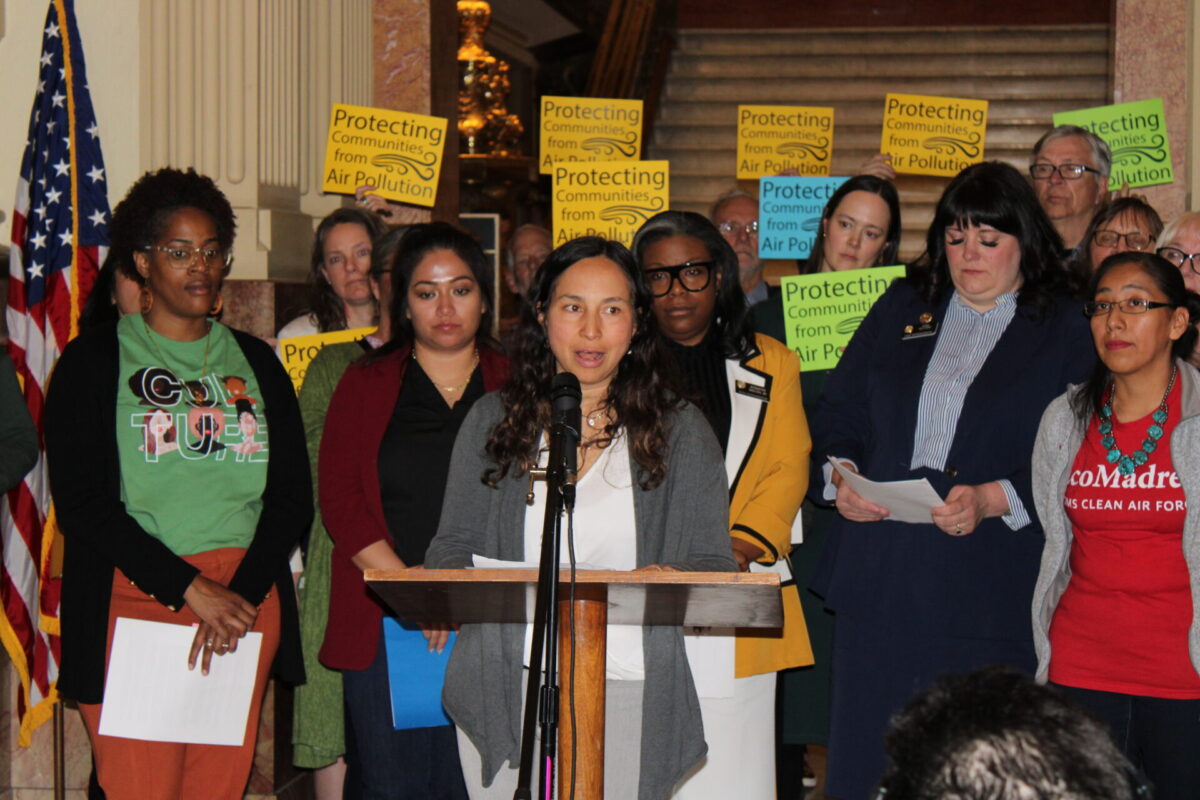Climate change is not just about polar bears and penguins; the effects of climate change are detrimental to our human communities, too. Issues such as air pollution, water availability, and extreme heat are all consequences of climate change and have a profound impact on public health.
Addressing these health concerns and mitigating the effects of climate change are at the core of Healthy Air and Water Colorado’s (HAWC) work. HAWC’s dedication lies in addressing the health concerns of climate change through the push for equitable and meaningful health policies and regulations, advocating for health justice, and raising awareness of this public health crisis in Colorado, a state where extreme heat and air pollution are critical issues.
HAWC, a U.S. Energy Foundation grantee, takes a unique approach, encouraging health professionals to be at the forefront of its strategies. “We recognize health professionals lend a really valuable perspective in humanizing the impacts of climate change…they are working directly with impacted communities,” says HAWC Director, Megan Kemp.

Mobilizing these health experts who are trusted members of the community and uplifting their voices is what sets apart HAWC’s work in the climate policy space. HAWC has a network of around 42,000 activists, more than 1,800 of which are health professionals from across the state. HAWC provides support and training for these providers to be able to build relationships with decision-makers, inform the media and educate the public at large.
Colorado, like many other places across the U.S., experiences extreme heat, which is dangerous, if not fatal. This year, the state of Colorado has recorded a historically high rate of 10.5 heat related illnesses (HRI) per 10,000 hospital visits. Additionally, Colorado’s renowned mountain range topography complicates the air pollution burden felt in-state by trapping pollution. This is one of the reasons why places such as Denver have high ozone pollution and have been classified as ozone nonattainment zones. Those most impacted and vulnerable to these impacts from climate change are in frontline communities with preexisting conditions, along with children and the elderly.
“Children are particularly vulnerable to poor air quality due to increased respiratory rates, so our schools should be able to have the resources they need to provide clean air.” says Dr. Lauren Brave, MD Pediatrician and HAWC advocate. “More than 30 Denver public schools called heat days last September during a hot streak, pointing to the need to improve cooling systems in schools.” Nationwide, extreme heat is causing schools to close for days at a time. As temperatures start to rise well into the school year, and 41% of schools are not equipped with proper cooling, students are left exposed and vulnerable to extreme heat.
According to a 2022-2023 report by HAWC, the number of Black and African-American Denver residents who didn’t have central air conditioning was almost double that of white survey participants. HAWC has been trying to address the disparity in access to cooling through advocating for the use of heat pumps and making them more accessible to underserved communities.
Looking forward, HAWC is hopeful in their mission to tackle extreme heat with climate-friendly solutions. “We look beyond just cooling in the home,” said Kemp. “We look at how we can get life-saving cooling to people, especially in a way that is not going to exacerbate climate pollution with fossil-fuel reliant appliances.”
EF’s mission to secure a clean and equitable energy future to tackle the climate crisis is in line with the remarkable work that grantee HAWC leads in Colorado. “They really spearheaded this initiative to make sure that we can mitigate the effects of climate change felt in Colorado—which is extreme heat and air pollution—while also taking action to reduce future carbon emissions by trying to increase the access to heat pumps for disproportionately impacted communities and low-income families,” says Mariela Hernandez, EF Program Director of West Campaigns.
Along with expanding access to energy efficient cooling, HAWC also is involved in projects promoting vehicle electrification, addressing ozone pollution and encouraging both state and federal regulations on air pollution. Within these various climate projects, HAWC continues to highlight and integrate the voices of health experts and community perspectives in the strategies it develops.
Working alongside health professionals and advocates, HAWC is determined and passionate to continue the fight for a healthy Colorado that creates healthy outcomes for all residents.
 Story author Henry Soria-Torres was a U.S. Energy Foundation intern in the summer of 2024.
Story author Henry Soria-Torres was a U.S. Energy Foundation intern in the summer of 2024.

